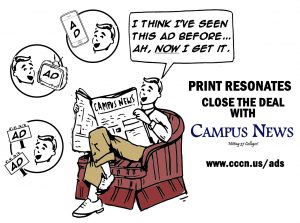By Julianne Mosher
Campus News
As we grow into adults during our college experience, we have to start making some big changes in our lives. As we grow as professionals, one important task that needs to get done is, when we realize we need to start cleaning out our closets, to start looking like a grown up in the office.
Vicky Oliver, author of “Live Like a Millionaire (Without Having to Be One)” (Skyhorse, 2015) and “301 Smart Answers to Tough Interview Questions” (Sourcebooks, 2005) gave some tips and insight about “What Your Business Attire Says About You.”
She lists five simple reminders for men and women to keep in mind while they get dressed in the morning for work, which range from everything including accessories to outfits. She highlights how these different ensembles represent how someone can be perceived in the workplace and how they can ultimately effect how a person will be treated, talked to and acknowledged by supervisors and higher ups.
Oliver notes the importance of clothing and how it can convey someone as a different person in the office. What one may wear outside, to the store, to a retail job, to the bar or at school should completely differ from what they should be wearing in the office as a professional – however, she does note that although the fashion may change depending on where someone is, their style should still resonate.
The professional fashion tips that this author preaches range from cutting down the ostentatious jewelry, steering clear from eccentric clothing and not even touching the sandals, sneakers, flannels or pajama pants in the closet while getting dressed that morning. She also advises to stay away from the fancy runway fashions – despite how cutting edge one may want to be – because the message of being too trendy may scare off and intimidate colleagues while being too aggressive.
 Starting off with eccentric clothing, Oliver exemplifies the men who like to wear bow ties and plaid shirts with the girls who wear flapper dresses in the office. “The message,” she begins, “generating stares and conversation with your ‘look’ will also generate thoughts such as, ‘Can I trust him to meet with our biggest client?’”
Starting off with eccentric clothing, Oliver exemplifies the men who like to wear bow ties and plaid shirts with the girls who wear flapper dresses in the office. “The message,” she begins, “generating stares and conversation with your ‘look’ will also generate thoughts such as, ‘Can I trust him to meet with our biggest client?’”
She notes that the best way to gain power is to blend in and doing so with style along with originality will get someone there.
Oliver continues to discuss that jewelry should also be kept at a minimal while being a professional. “If you love to be dripping in god and diamonds,” she says, “Great, but keep this look for your weekend and night life.”
The message, she says, that too much shine can give off is jealousy, envy or overall confusion because too much bling is just too much in general.
Some people may begin to get comfortable at their job and start to wear pajama pants and Oliver says this is a huge “NO.”
“Whether you mean to or not, you’re telling coworkers that you’re super chill and maybe even a bit flaky,” she says. “Will they be able to count on you to put in long hours, to make your sales quota, and to sacrifice for the good of the team? Even for casual Fridays, items such as blue jeans may not be appropriate. Find out what ‘casual’ means and then dress a little nicer than required.”
However, the range in attire starting with pajama pants, flannels and flip flops also correlates with the high end fashions straight off the runway.
“Their clothes may be too fashion forward for the office,” she says.
There is a way to work the high fashion into a work ensemble, Oliver says. “One way to finesse this, if you really love a bit of flare, is to choose a single item—a shirt with an interesting cut, or a pair of ridiculously amazing shoes-and keep the rest of your outfit more mainstream.”
Lastly, Oliver promotes what she calls “the uniform” for the office. For both men and women, a classic dark colored suit and a light shirt underneath is the go-to for all professional needs.
“Wearing the uniform pegs you as conservative, a tag that can either help or hurt your image, depending on your company and industry,” she says. “But this combo tends to read ‘polished’ if the suit is well-fitted and the shirt pressed and crisp. When in doubt, the uniform won’t usually steer you wrong. If your colleagues are more casual, remove the jacket.”
Luckily, there’s a lot more advice than these five tips, which Oliver shared exclusively with Community College Campus News.
Oliver took the time to answer some questions in an email interview with CCCN about how she became an office fashion guru along with her advice for students who are beginning to find their place in the job market and do not know what to wear.
CCCN: What made you want to start writing about attire and books on business in general?
VO: I used to work in the advertising business where job-hunting was a way of life. I also rose from receptionist to creative director, and eventually I was hiring people. So often I would see candidates roll in, badly dressed and ill informed about the ad agency.
I thought, I have to write a book about job-hunting. I thought it about a hundred times and then one day, I wrote the book. That book led to other books. Style, selling yourself, and business etiquette inform all my books.
CCCN: When you’re working with someone or asking someone to work with you, do you judge them based on what they’re wearing as a professional?
VO: Because I write about it, I am less judgmental than others might be. But human resource managers and others in a position to hire make snapshot decisions on candidates in less than a minute. The trick is always “know your audience.” Who do you need to make a good impression on today? Then, dress for that person.
CCCN: In the professional world do you believe that dressing oddly or “too much” could result in a bad working experience?
VO: Yes, but let me explain why. As a general rule, you are better off striving to fit in rather than stand out. The worker with tattoos, piercings in creative places, and funky attire will be tolerated in three situations — a) when he/she is bringing in business; b) when the company and/or economy are on an upswing and there is a shortage of capable, intelligent workers and c) when there is a general move to shake up the status quo. However, when business dries up or the economy goes south, there will be a contraction of workers. Fewer staffers will have to be sent to more client meetings. In that situation, the worker who stands out is not as great an asset. Another way to think of it: the worker who stands out through his dress code is essentially asking all to bend the rules a bit. The person who follows the dress code rules isn’t. He isn’t putting an obstacle in the way that folks have to get over first.
CCCN: What advice do you have for those people who dress the way you noted in your tip list (a lot of jewelry, see-through stockings, etc.) to ditch their bad habits especially if it’s hard for them to not wear their dazzling jewels?
VO: My advice is that self-expression is better for certain kinds of companies and to make sure the company where you work is one of them. I personally collect cowboy boots, but I wouldn’t wear a pair to a job interview at a traditional company.
CCCN: For students, what advice do you want to give us who are looking for jobs and internships who are also trying to make a professional name for ourselves?
VO: Don’t be shy. Ask your parents, your parents’ friends, your career counselor at school — everyone! — for help. Go on informational interviews. Get out there!





Facebook Comments